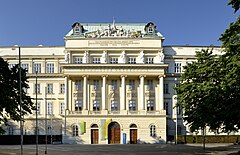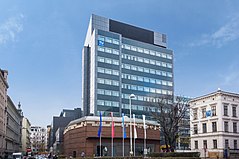TU Wien
Technische Universität Wien | |
 | |
| Motto | Technik für Menschen |
|---|---|
Motto in English | Technology for people |
| Type | Public |
| Established | November 6, 1815 |
| Founder | Emperor Francis I of Austria |
| Affiliation | |
| Budget | €271 million (2019)[1] |
| Rector | Jens Schneider |
Academic staff | 4,228 (2020)[1] |
Administrative staff | 1,271 (2020)[1] |
| Students | 26,654 (2021)[1] |
| Location | , Austria |
| Campus | Urban |
| Website | tuwien.at |
 | |



The Vienna University of Technology (German: Technische Universität Wien) is a public research university in Vienna, Austria.[2]
The university's teaching and research are focused on engineering, computer science, and natural sciences. It currently has about 28,100 students (29% women), eight faculties, and about 5,000 staff members (3,800 academics).
History
[edit]The institution was founded in 1815 by Emperor Francis I of Austria as the k.k. Polytechnisches Institut (English: Imperial-Royal Polytechnic Institute). The first rector was Johann Joseph von Prechtl. It was renamed the Technische Hochschule (English: Technical College) in 1872. In 1975, it was renamed Technische Universität Wien (English: Vienna University of Technology).[3]
Academic reputation
[edit]As a university of technology, Vienna University of Technology covers a wide spectrum of scientific concepts from abstract pure research and the fundamental principles of science to applied technological research and partnership with industry.
The Vienna University of Technology is ranked #190 by the QS World University Ranking, #406 by the Center of World University Rankings,[4] and it is positioned among the best 251-300 higher education institutions globally by the Times Higher Education World University Rankings. The computer science department has been consistently ranked among the top 100 in the world by the QS World University Ranking[5] and The Times Higher Education World University Rankings[6] respectively.
| Ranking | 2019 | 2018 | 2017 | 2016 | 2015 | 2014 | 2013 | 2012 |
|---|---|---|---|---|---|---|---|---|
| QS World University Rankings[7] | 199 | 182 | 183 | 197 | 246 | 264 | 274 | |
| QS Faculty Rankings: Engineering & Technology[8] | 127 | 142 | 115 | 93 | 93 | 91 | 132 | - |
| QS Subject Rankings: Mechanical Engineering [9] | 151-200 | 151-200 | 101-150 | 101-150 | 151-200 | 151-200 | 151-200 | - |
| QS Subject Rankings: Electrical Engineering [10] | 101-150 | 101-150 | 101-150 | 101-150 | 101-150 | 51-100 | 51-100 | - |
| QS Subject Rankings: Chemical Engineering [11] | 101-150 | 151-200 | 151-200 | - | 151-200 | - | - | - |
| QS Subject Rankings: Civil & Structural [12] | 101-150 | 101-150 | 101-150 | 101-150 | 101-150 | 101-150 | 101-150 | - |
| QS Subject Rankings: Computer Science [13] | 51-100 | 51-100 | 51-100 | 51-100 | 51-100 | 51-100 | 51-100 | - |
| The Times Higher Education World University Rankings [14] | 251-300 | 251-300 | 251-300 | 226-250 | 226-250 | 251-275 | 301-350 | |
| The Times Higher Education Subject Rankings: Engineering and Technology [14] | 151-175 | 126-150 | 91 | 100 | 96 | - | - | |
| The Times Higher Education Subject Rankings: Computer Science | 76 | |||||||
| Academic Ranking of World Universities (Shanghai Ranking's)[15][16] | 301-400 | 401-500 | 401-500 | 401-500 | 401-500 | 401-500 | 401-500 | |
| Academic Ranking of World Universities, Subject field: Computer Sciences [17][18] | 76-100 | - | - | 101-150 | 76-100 | 76-100 | 101-150 | |
| Academic Ranking of World Universities, Subject field: Electrical Engineering [19] | 101-150 | 76-100 | - | - | - | - | ||
| Academic Ranking of World Universities, Subject field: Materials Science [20] | 151-200 | 101-150 | - | - | - | - | ||
| Academic Ranking of World Universities, Subject field: Mechanical Engineering[21] | - | 101-150 | - | - | - | - |
Organization
[edit]The Vienna University of Technology has eight faculties led by deans: Architecture and Planning, Chemistry, Civil Engineering, Computer Sciences, Electrical Engineering and Information Technology, Mathematics and Geoinformation, Mechanical and Industrial Engineering, and Physics.
The university is led by the Rector and four Vice Rectors (responsible for Research, Academic Affairs, Finance as well as Human Resources and Gender). The Senate has 26 members. The University Council, consisting of seven members, acts as a supervisory board.
Research
[edit]Development work in almost all areas of technology is encouraged by the interaction between basic research and the different fields of engineering sciences at Vienna University of Technology. Also, the framework of cooperative projects with other universities, research institutes and business sector partners is established by the research section of Vienna University of Technology. TU Wien has sharpened its research profile by defining competence fields and setting up interdisciplinary collaboration centres, and clearer outlines will be developed.
Research focus points of Vienna University of Technology are introduced as computational science and engineering, quantum physics and quantum technologies, materials and matter, information and communication technology and energy and environment.
The EU Research Support (EURS) provides services at Vienna University of Technology and informs both researchers and administrative staff in preparing and carrying out EU research projects.
Notable faculty and alumni
[edit]


- Adolph Giesl-Gieslingen (1903–1992), Austrian locomotive designer and engineer
- Alexander Meissner (1883 – 1958), Austrian engineer and physicist, co-inventor of the Electronic oscillator
- Alfred Preis (1911–1993), designer of the USS Arizona Memorial in Pearl Harbor
- Benno Mengele (1898–1971), Austrian electrical engineer
- Camillo Sitte (1843-1903), Austrian architect
- Christian Andreas Doppler (1803–1853), Austrian mathematician and physicist
- Edmund Hlawka (1916-2009), Austrian mathematician
- Edo Šen (1877–1949), Croatian architect
- Elfriede Tungl (1922-1981) civil engineer, first Austrian woman to earn a doctorate in civil engineering, in 1973 became the first female associate professor at Vienna University of Technology.
- Ernst Hiesmayr (1920-2006), architect, artist and former rector of Vienna University of Technology
- Ferdinand Piëch (1937-2019), Austrian business magnate, engineer and executive who was the chairman of the supervisory board of Volkswagen Group
- Ferenc Krausz (born 1962), Hungarian–Austrian physicist, Nobel Prize in Physics 2023
- Franz Pitzinger (1858–1933), Constructor General of the Austrian Navy
- Gottfried Ungerboeck (1940), inventor of trellis modulation, IBM Fellow
- Günter Blöschl (born 1961), Austrian hydrologist
- Hannspeter Winter (1941-2006), Austrian plasma physicist
- Heinz Zemanek (1920-2014), Austrian computer pioneer
- Hellmuth Stachel (born 1942), Austrian mathematician
- Herman Potočnik (1892–1929), Slovene space pioneer
- Hermann Knoflacher (born 1940), Austrian engineer
- Hubert Petschnigg (1913–1997), architect (completed his studies at TU Graz)
- Hugo Ehrlich (1879–1936), Croatian architect
- Ignaz Sowinski (1858–1917), architect
- Ina Wagner (born 1946), Austrian physicist, sociologist, professor of computer science 1987 – 2011, TU's second ever female professor
- Ingeborg Hochmair (born 1953), electrical engineer, developed the first microelectronic, multi-channel cochlear implant
- Irfan Skiljan, author of the image viewer software Irfanview
- Jörg Streli (1940–2019), Austrian architect
- Karl Gölsdorf (1861–1916), Austrian engineer and locomotive designer
- Leon Kellner (1859–1928), grammarian, Shakespearean, and Zionist
- Marie-Therese Hohenberg (born 1972), Austrian architect
- Milan Vidmar (1885-1962), Slovene electrical engineer
- Milutin Milanković (1879–1958), Serbian geophysicist and civil engineer
- Ottó Titusz Bláthy (1860–1939), Hungarian mechanical engineer
- Paul Eisler (1907–1992), inventor of the printed circuit
- Paul Schneider-Esleben (1915–2005), visiting professor of architecture
- Peter Schattschneider (1950), Austrian physicist
- Peter Skalicky (born 1941), rector of Vienna University of Technology from 1991 to 2011
- Richard von Mises (1883–1953), scientist
- Rudolf Steiner (1861-1925), Austrian philosopher and transdisciplinary researcher
- Rudolph Michael Schindler (1887–1953), early Modern architect
- Siegfried Becher (1806–1873), professor of economics
- Silke Bühler-Paschen, professor of physics
- Tillman Gerngross, Professor of Engineering at Dartmouth College, leading entrepreneur and bioengineer, founder of GlycoFi and Adimab
- Ulrike Diebold (born 1961), Austrian–American physicist, vice president of the Austrian Academy of Sciences
- Viktor Kaplan (1876–1934), inventor of the Kaplan turbine
- Vinzenz Bronzin (1872-1970), Italian mathematics professor, and pioneering finance theorist
- Yordan Milanov (1867–1932), one of the leading Bulgarian architects from the end of 19th and the beginning of the 20th century
- Zvonimir Richtmann (1901–1941), Croatian physicist, philosopher, politician and publicist

Library
[edit]The TU Vienna Bibliothek, the university library, was founded in 1815. The main library building was designed by the architects Justus Dahinden, Reinhard Gieselmann, Alexander Marchart, Roland Moebius, and partners. Completed in 1987, it features owl sculptures by the Swiss artist Bruno Weber. The main library has six floors of open access areas and reading rooms, with around 700 study desks.
Sports
[edit]The university hosted the IFIUS World Interuniversity Games in October 2007.
See also
[edit]Notes and references
[edit]- ^ Jump up to: a b c d "Die Vienna University of Technology in Zahlen (The TU Vienna in numbers)". Archived from the original on 14 January 2023. Retrieved 14 Jan 2023.
- ^ "About TU Wien". www.tuwien.at. 2019-05-08. Archived from the original on 2020-03-04. Retrieved 2019-05-11.
- ^ "Corporate Design". Technische Universität Wien. Archived from the original on 2017-10-22. Retrieved 2017-11-28.
- ^ "Global 2000 List by the Center for World University Rankings". Archived from the original on 2021-05-22. Retrieved 2021-06-01.
- ^ "Computer Science and Information Systems World University Ranking". Archived from the original on October 7, 2019. Retrieved April 4, 2019.
- ^ "The Times Higher Education University Ranking by Subject". Archived from the original on April 6, 2019. Retrieved April 8, 2019.
- ^ "Technische Universität Wien". Top Universities. Archived from the original on 2021-09-20. Retrieved 2021-09-16.
- ^ "Engineering and Technology". Top Universities. Archived from the original on 2017-08-09. Retrieved 2021-09-16.
- ^ "QS World University Rankings by Subject 2015 - Engineering - Mechanical, Aeronautical & Manufacturing". Top Universities. Archived from the original on 2021-09-16. Retrieved 2021-09-16.
- ^ "QS World University Rankings by Subject 2015 - Engineering - Electrical & Electronic". Top Universities. Archived from the original on 2021-09-16. Retrieved 2021-09-16.
- ^ "QS World University Rankings by Subject 2015 - Chemistry". Top Universities. Archived from the original on 2019-07-07. Retrieved 2021-09-16.
- ^ "QS World University Rankings by Subject 2015 - Engineering - Civil & Structural". Top Universities. Archived from the original on 2021-09-16. Retrieved 2021-09-16.
- ^ "QS World University Rankings by Subject 2015 - Computer Science & Information Systems". Top Universities. Archived from the original on 2019-07-07. Retrieved 2021-09-16.
- ^ Jump up to: a b "TU Wien". Times Higher Education (THE). 2021-09-08. Archived from the original on 2021-08-12. Retrieved 2021-09-16.
- ^ "Academic Ranking of World Universities". Archived from the original on 2021-02-13. Retrieved 2015-06-11.
- ^ "Academic Ranking of World Universities 2018". Archived from the original on August 16, 2018. Retrieved April 8, 2019.
- ^ "Academic Ranking of World Universities, Subject field: Computer Sciences". Archived from the original on 2021-02-13. Retrieved 2015-06-11.
- ^ "Subject Ranking 2018". Archived from the original on October 16, 2019. Retrieved April 8, 2019.
- ^ "Academic Ranking of World Universities, Subject field: Electrical Engineering". Archived from the original on 2016-07-04. Retrieved 2016-06-22.
- ^ "Academic Ranking of World Universities, Subject field: Materials Science & Engineering". Archived from the original on 2016-09-13. Retrieved 2016-06-22.
- ^ "Academic Ranking of World Universities, Subject field: Mechanical Engineering". Archived from the original on 2018-06-21. Retrieved 2016-06-22.
External links
[edit]- Official website
- Continuing Education Center – TU Wien (MBA programs, MSc programs, certified)
- Curricula (fields of study and courses)
- TISS Information System (e.g. links to Publications Database)
- TU Wien on Youtube (English playlist)

